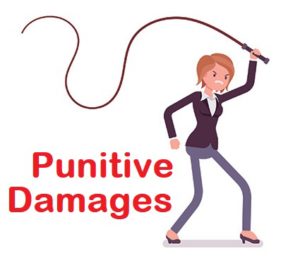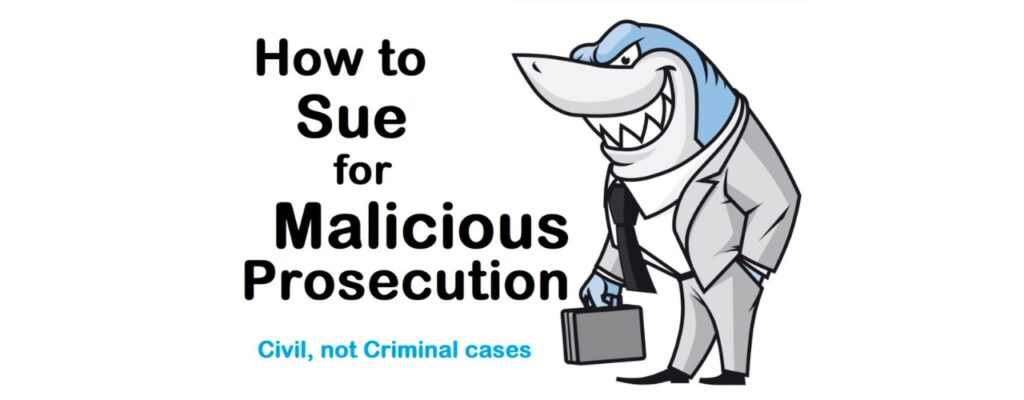You get sued. They claim to be the “victim,” but you are the real victim. You are being sued based on a falsehood … for their improper motives. Can you strike back for justice?
Victims often ask lawyers whether they can sue for malicious prosecution. Situations arise when a victim has been sued wrongfully. They have stress. They have legal expenses. Other costs come in. The wrongful lawsuit damages their reputation. It may even be damage their credit rating.
Some victims merely want emotional support. They want someone to tell them they are right, the person that sued them is wrong, and provide sympathy. That is certainly the expected role of family, and friends. It is a whole other matter entirely to counter – sue the person and attempt to win money from them.
The Benefits of Malicious Prosecution Suits
Malicious prosecution lawsuits have three main benefits:
- Compensation for out of pocket and other expenses.
- Deter or prevent the wrongdoer from wrongfully suing others in the future.
- Deter other similar wrongdoers from creating victims.
The same legal analysis must be completed regardless of whether you are a victim or an attorney. This article explains the process in a civil setting. Look to our companion article on criminal cases.
The Technical Legal Test to Win at Malicious Prosecution
The traditional elements of a lawsuit for malicious prosecution are as follows:
- The commencement or prosecution of a proceeding against the victim;
- “Legal Causation” by the present defendant;
- The lawsuit’s termination in favor of the present plaintiff;
- The absence of probable cause for the proceeding;
- The presence of malice;
- Damage to the victim.
State ex rel. O’Basuyi v. Vincent, 434 S.W.3d 517, 519 (Mo. banc 2014);
Bonzo v. Kroger Grocery and Baking Co., 125 S.W.2d 75 (Mo. 1939);
Higgins v. Knickmeyer-Fleer Realty and Investment Co., 74 S.W.2d 805,812 (Mo. 1934).
This is the traditional law for malicious prosecution. Is it confusing you? There is an easier analysis.
The Easier to Understand Test for Malicious Prosecution
The Missouri Approved Instructions for a jury trial present a straightforward analysis for evaluating potential malicious prosecution cases. It is meant for ordinary people to understand and will be easier for you.
The test for malicious prosecution is as follows:
- First, did the wrongdoer instigate or continue a judicial proceeding (a lawsuit) against the victim (you) that the victim won?
- Second, in doing that, did the wrongdoer acted maliciously and without reasonable grounds?
- Third, was the victim damaged?
Paraphrase of M.A.I. 23.07 (2000 Rev.).
What Does “Maliciously” mean?

You may have noticed some technical terms. They are important. The first term is “maliciously.” In a civil setting, maliciously means intentionally doing a wrongful act without just cause or excuse. It does not necessarily mean hatred, spite, or ill will. M.A.I. 16.01 (1) (1996 new); see also Sanders v. Daniel Intern Corp., 682 S.W.2d 803 (Mo. banc 1984); and Proctor v. Stevens Employment Services, Inc., 712 S.W.2d 684 (Mo. banc 1986).
What Is Reasonable Grounds?
Reasonable grounds is also needed for your analysis of whether you have a malicious prosecution case. Luckily, reasonable grounds is defined. “Reasonable grounds” means the existence of facts which would cause an ordinarily careful person to believe plaintiff (the victim) was guilty of the offense charged. See Palcher v. JC Nichols Co., 783 S.W.2d 166 (Mo. App. 1990).
Our Law Dislikes Malicious Prosecution Cases
Malicious prosecution cases are not favored in the law. Stafford v. Muster, 582 S.W.2d 670, 675 (Mo. banc 1979). Because of this, you as the victim must be prepared to provide “strict and clear proof” of each of the elements of malicious prosecution. Id.
Probable Cause Weighs In Too!
The second element of malicious prosecution requiring reasonable grounds is closely related to probable cause. You should plan on addressing the probable cause elements as part of your malicious prosecution case.
The Missouri Supreme Court has set out a definition for probable cause in civil cases. It is as follows:
- The person’s beliefs in the facts alleged,
- Based upon sufficient circumstances to reasonably induce such belief by a person of ordinary prudence in the same situation, plus
- A reasonable belief that under the facts the claim may be valid under the applicable law.
Holly v. Caulfield, 49 S.W.3d 747, 750-51 (Mo. App. 2001).
The Easy to Understand Test for Probable Cause
Basically, you need to ask yourself the following questions:
- Did the person who sued you believe the facts they were alleging?
- Would any reasonable person believe those facts?
- Did the law allow a lawsuit against you; under those facts, assuming they were true?
Can I Get Punitive Damages To Punish?

Punitive damages are called “exemplary damages” and are not favored by the courts, much like malicious prosecution cases. To get punishment damages in a malicious prosecution case, “the proceedings must have been initiated or continued primarily for a purpose other than that of securing the proper Judication of the claim on which they are based.” Proctor v. Stevens Employment Services, Inc., 712 S.W.2d 684 (6, 7) (Mo. banc 1986). Remember that punitive damages require a separate determination by the court by “clear and convincing evidence,” which is a higher standard. Remember, who you are suing must have acted with a conscious disregard for your rights. I encourage you look to my article on punitive damages to see the specific elements of that cause of action.
Conclusion
Malicious prosecution cases are complex and have many legal requirements, as you can see. This is why malicious prosecution is so often an accusation and so seldom an actual lawsuit.
Usually, these lawsuits come about when it is either debt collector who does not care what the facts are and sues as many people as they can to collect money. Secondly, we see malicious prosecution lawsuits when it is an actual person who is just suing to “get at” somebody. I wish you luck in your analysis and hope any victims can receive just compensation based upon our analysis.



